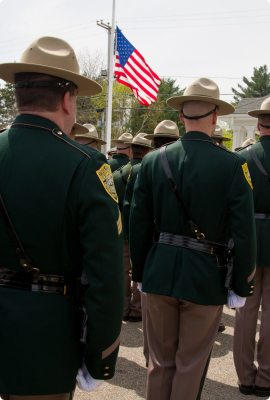This Changes Everything
In 2019, law enforcement line of duty deaths hit one of the lowest numbers there has ever been. At the same time suicides reached the highest number since records have been kept. U.S. law enforcement officers now take their own lives at over 4.5 times the rate they are murdered.
Psychological survival school is MFP’s premier training program. This full day program is the culmination of almost 2 years of work trying to answer one question: “today, mental health treatment is more accessible than ever, departments are more open to it, as are individuals, so why is the number of Law Enforcement suicides the highest they have ever been”?

Up until now, our programs for law enforcement mental health have been on a continuum with resilience and stress management at one end, and professional treatment at the other. But we have never asked ourselves “what happens when resilience fails, and people either can’t or won’t enter professional treatment, what do we have in between”? The answer is nothing, and we believe that this is where we are losing so many people to suicide.
In the 3 decades since law enforcement began to recognize the effects of stress and trauma on officers, Psychological Survival School is the first truly unique approach to PTSD intervention and suicide prevention for law enforcement. Until now every other approach has been based on modifications of existing civilian programs. Survival school not only looks at the problem in a completely new light, it was created from the ground up by law enforcement for law enforcement.
Researchers estimate that approximately 10 to 17 percent of police officers in the United States demonstrate symptoms of PTSD
Until now our psychological programs concerning resilience, education, and suicide prevention, can be thought of as tactical in nature. That is, they are designed to prevent the worst from happening. Survival schools take the opposite view, they assume the worst already has happened and give people the tools and knowledge they need to ultimately survive. We believe this is what our intervention and suicide prevention programs have been lacking up until now.
A Comprehensive Answer
In the past, most law enforcement focused mental health training left departments with no guidance or support on how to establish and implement an agency mental health program. The result was many programs that ultimately failed, and many more that never even began. Psychological Survival School does not only offer training for your personnel. It includes a plan for your department to institute and operate its own personalized mental health program. Your department will be provided with materials, tools, services, and support from our team of professionals from start to finish.

The 3 M's
The basis of Psychological Survival School is what we call the 3 M’s. To minimize and mitigate psychological damage. And most importantly to monitor mental health.
Minimize
Mitigate
Monitor
Law enforcement officers in the US now take their own lives at over 4 1/2 times the rate they are murdered.

Technology can change anything, maybe even lives.
True North ™ is MFP’S mental health monitoring app we provide to departments in conjunction with Psychological Survival School training. It allows officers to self assess their stress level and monitor their mental health on a weekly basis, and alerts them to dangerous stress levels even if they are reluctant to work with a professional counselor. In the event a critical stress level is identified, it offers immediate one button connection to your departments mental health resources. It also gives a variety of metrics to command staff to evaluate their departments overall mental health and wellness.
The intent of this program is not to replace conventional professional treatment. Rather, it is meant to give people whose treatment is delayed due to either external or internal forces, the tools they need to survive until they can get to that treatment. These delays can take many different forms, from institutional resistance on the part of the department, to personal resistance from the individual Officer, to family, social, or other issues.
There has been a long-standing debate among trauma surgeons regarding the question: what is the finite amount of shock and trauma the human body can withstand? What is the tipping point where a wound becomes un-survivable? But when they look at the data, case studies, and personal experience, the answer is always the same: how badly does the person want to survive? The will to survive can beat any odds, and that is the goal of this program, to create survivors.
Today, Law Enforcement agencies spend enormous amounts of money on equipment, weapons, communications, and training to prepare their officers to face the most dangerous people on earth. We now have to ask the question: what do we do to prepare them for the day when the most dangerous person they could ever face is themself?
There are over



